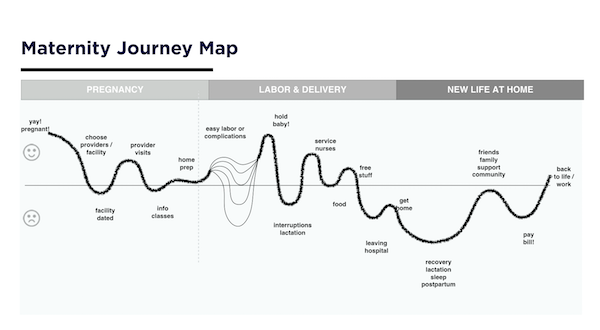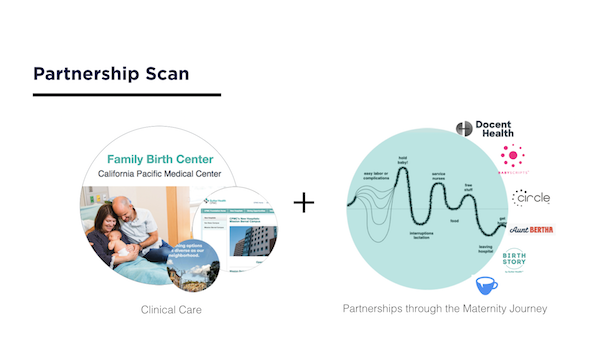Get More out of Your Journey Map With a Partnership Scan

Journey mapping is a tool central to service design. It helps you better understand the interactions people have with your company and identify the moments that matter most. But journey maps can also serve another function—they’re an ideal guide for identifying parts of your customer’s journey where partnerships can play a key role.
Chris Waugh, Chief Innovation Officer at Sutter Health, recently joined us on a Creative Confidence Series webcast to share how his team uses journey mapping to both build consensus and excitement around projects and identify partnership opportunities with an activity called a “partnership scan.” This approach enables his team to see where partnerships would have the most impact and helps them prioritize which ones to pursue.
Innovation teams have three main options when deciding how to go about developing a new idea—they can build a new product or service themselves, buy a service or acquire a company that offers it, or partner with someone who is doing it already.
For Chris’ team at Sutter, they have a huge list of possible projects they’d love to work on. An aha moment was when they realized “we don’t have to do all this from scratch. In fact, if we do, it’s a big disservice to ourselves because we’re going to go so slowly.”
How to do a partnership scan
If you’re considering partnership as a route to fulfill a business need, do these three steps to complete a partnership scan:
1) Define your customer journey.
Create a journey map to capture the entire cycle of experience a customer has with your product or service. Determine and select the key moments in your customer journey—the opportunities of maximum impact—to design.
2) Separate your journey into segments.
When the team at Sutter Health mapped the journey for new mothers, they separated it into three segments: pregnancy, labor and delivery, and new life at home. Some of those segments happen primarily inside the walls of the hospital and others, like the last segment at home, happen outside of the hospital walls.

3) Identify segments where you’re lacking expertise.
This differentiation of which experiences happened inside or outside of the hospital was critical in determining which areas had the most potential for partnership. Sutter realized that the last segment of the maternity journey was full of experiences where they had less expertise and ownership—but there were still critical moments that mattered in this final segment.
Ask yourself “is there another company that would be better at this thing than we are?” For example, Sutter manages an apartment in San Francisco for transplant patients coming to the hospital. Chris knows this service is important and impactful for their patients but acknowledges that Airbnb is likely better at managing apartment sharing. Those are the moments where opportunity awaits.

In the maternity journey example, Sutter health decided to work with a partner to provide a docent, or guide, for mothers that would extend beyond their labor and delivery experience to their new life with a baby at home. This text message companion answered new moms’ questions, from “When should I push the nurse button?” to “Where is the best place to get a vanilla milkshake?”, and ended up providing better data and real-time feedback on the customer experience than they could have imagined.
Could Sutter have built this docent service itself? “We could have done it, but it wouldn’t have been as elegant,” Chris said.
“These partners really help us advance and because of that we can touch more lives faster, which gets back to our goal.”
See more examples of the work Sutter has done with partners to improve and humanize the healthcare experience on their innovation site, and hear more about Sutter’s work in Chris’ episode of our Creative Confidence Series webcast.
Want to learn more about journey mapping? Check out our course Human-Centered Service Design, part of our Advanced Design Thinking Certificate program.
- choosing a selection results in a full page refresh
- press the space key then arrow keys to make a selection



